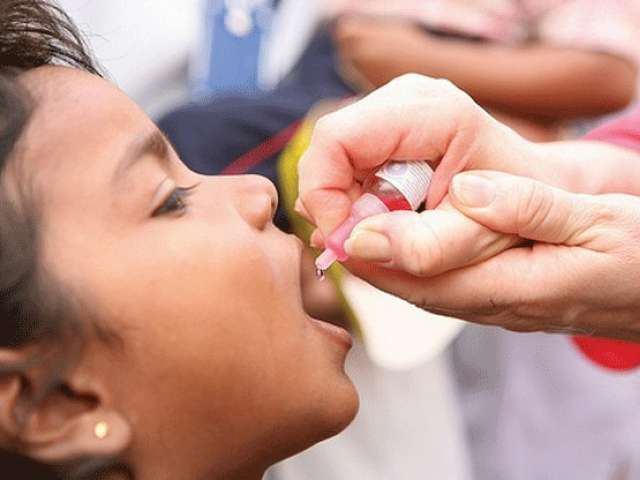Shot in the arm: $338m earmarked for fighting polio
ECNEC approves eight projects worth over Rs105 billion

PHOTO: REUTERS
The Executive Committee of National Economic Council (Ecnec) – the highest project approval body of Pakistan – approved the scheme for the period of 2016 to 2018. Finance Minister Ishaq Dar chaired the meeting.

The country spent $311 million between 2012 and 2015 but could not eradicate poliovirus. The cumulative spending from 2012 through 2018 would increase to $648 million or Rs68 billion at the current exchange rate.
Most of the $338 million funding has already been lined up and efforts are underway to arrange the remaining $32 million or 9% of the total cost, Saira Afzal Tarar, the minister of state for national health services, regulation and coordination, told The Express Tribune.
Earlier, the Islamic Development Bank (IDB) had approved financing of $100 million to assist the polio eradication programme in Pakistan during 2016-18, she added. The other lenders were Japan, Germany, United Arab Emirates, the United States and Canada.
The minister said savings of $32 million from the previous phase would also be utilised for the new phase.
The Bill and Melinda Gates Foundation will pick up the interest cost of the loan that Pakistan has obtained to continue the eradication campaign. The country has acquired the loans at an interest rate ranging between 1% and 1.5%, said a planning commission official.
Unicef will procure vaccines and will undertake social mobilisation activities. The World Health Organisation (WHO) will conduct the operational activities of the supplemental immunisation activities, including surveillance. Around 698 million doses of polio vaccine will be administered to vulnerable children across Pakistan.
The WHO says Pakistan accounted for the majority of all wild poliovirus cases reported worldwide last year. The Global Polio Eradication Initiative says both Pakistan and Afghanistan will have to redouble their efforts to stop transmission.
Last year 53 polio cases were reported in Pakistan as compared to 19 in Afghanistan. But the figure was substantially lower than the 305 reported in 2014.
More schemes approved
The Ecnec meeting approved eight projects worth over Rs105 billion.
The panel approved the construction of tunnels on Neelum Valley road at a cost of Rs7 billion. The road construction component was, however, deferred due to over financing of Rs10 billion.
It approved a water carrier channel from the Nabisar reservoir to Thar Coal Field Block-II at a cost of Rs15.7 billion.
In the case of construction of 26 small dams in Balochistan, Ecnec approved the replacement of Katki Khaisar dam with Zard Ghulam Jan dam. The project has already been approved at a cost of Rs4.7 billion.
It also approved 128MW revised Keyal Khwar hydropower project at a cost of Rs26.1 billion.
The panel also approved the twice-revised Punjab Economic Opportunities programme in the agriculture sector at a cost of Rs8.8 billion. The project will benefit 145,000 people in the rural economy. The program aims at improving service delivery to farmers and introducing support mechanisms for timely access to quality inputs through establishment of rural business hubs.
A 220KV transmission system network reinforcement project for Islamabad and Bhurban worth Rs3.6 billion and rehabilitation of the 45-kilometre-long Jalalpur-Perwala-Uch section of the Multan-Trinda Muhammad Pannah Road were also approved at a cost of Rs4.7 billion.
Published in The Express Tribune, January 30th, 2016.



















COMMENTS
Comments are moderated and generally will be posted if they are on-topic and not abusive.
For more information, please see our Comments FAQ